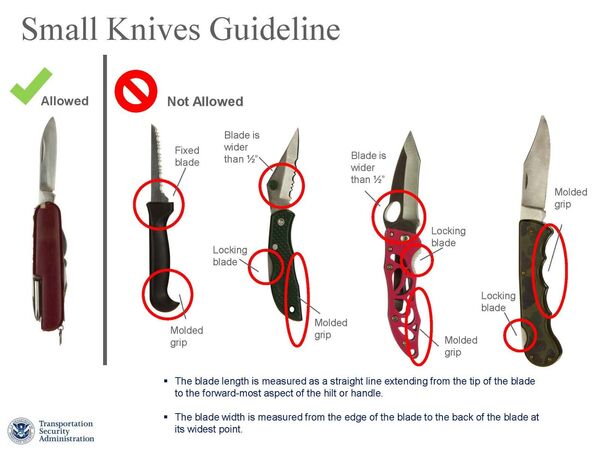WASHINGTON, March 6 (By Sasha Horne for RIA Global) A move this week to allow pocketknives and other restricted items onboard US airplanes has sparked a heated debate among aviation experts, airline workers and politicians over airline security and safety standards in post-9/11 America.
“As the last line of defense in the cabin… we believe that these proposed changes will further endanger the lives of all flight attendants and the passengers we work so hard to keep safe and secure,” said the Flight Attendants Union Coalition in a statement.
The group, which represents nearly 90,000 flight attendants across the United States, said a decision by the US Transportation Safety Administration (TSA) to allow knives and other previously-banned items on board US airplanes was “poor and shortsighted.”
Under terms of the decision announced Tuesday, small knives with non-locking blades smaller than 2.36 inches (6 centimeters) and less than one-half inch (1.2 centimeters) in width will be permitted aboard flights in the United States beginning April 25, relaxing a ban that was put in place after the 9/11 terrorist attacks.
Other previously banned items that will be allowed under the new rules include small novelty or toy baseball bats, ski poles, hockey and lacrosse sticks, billiard cues and up to two golf clubs.
The decision “is part of an overall risk-based security approach, which allows transportation security officers to better focus their efforts on finding higher threat items such as explosives,” TSA officials in a statement.
The announcement was met with mixed reaction from the aviation industry, including a firestorm of criticism from airline workers and politicians on Capitol Hill.
“Developing policies in a vacuum that will impact millions of passengers and critical stakeholders is a disservice to the American public,” said Rep. Bennie Thompson, ranking member of the House Homeland Security Committee, in a statement.
Thompson said the new policy could confuse passengers with “potentially contradictory airline policy,” but some aviation experts said passengers were already confused and the new rules could be helpful.
“In Europe, passengers are allowed to carry pocket knives and then they arrive in the US, they are confused as to why they can’t have them,” said Doug Moss, a commercial pilot and owner of AeroPacific Consulting, an aviation training and research firm, in an interview with RIA Novosti on Wednesday.
The more standardization the TSA can have with international aviation rules, the better, Moss said.
Prior to the terrorist attacks that took place on September 11, 2001, airline passengers in the United States were allowed to carry blades less than four inches long. Box cutters similar to the kind used to execute the 9/11 attacks were not specifically banned by the federal government at the time. They remain banned under the new rules.
“No matter what system we have in place, people will always find ways around it,” said Todd Curtis, an aviation safety expert and founder of AirSafe.com, a website that offers airline travel and safety resources.
While small pocketknives could be used as weapons, Curtis said, the TSA spends a significant amount of time searching for these hard-to-find items, and could better spend its time on “higher priority” threats.
The Air Line Pilots Association (ALPA), a union that represents nearly 51,000 pilots in the United States and Canada, agreed.
“ALPA supports TSA efforts to streamline security and shift focus to individuals who intend to do harm,” the group said in a statement. “These TSA initiatives increase resources for screening so that they focus on the real security threats instead of objects.”


